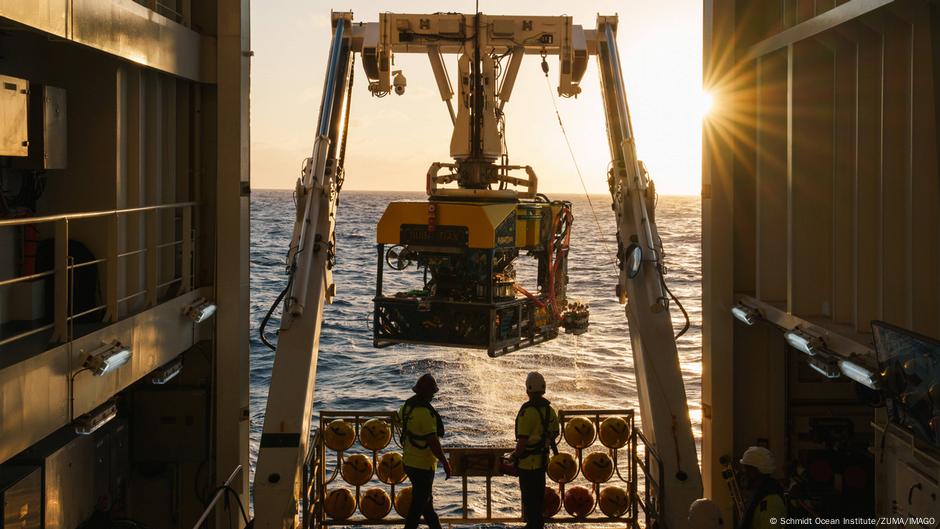The Rise of Deep-Sea Mining and the Controversial Push for International Waters
As the global race for critical minerals intensifies, a Canadian company is preparing to challenge international laws and begin extracting battery-grade metals from the ocean floor. This development comes amid ongoing discussions in Jamaica about establishing rules to protect the deep sea for future generations. The potential start of the world’s first commercial deep-sea mining operation in international waters has sparked heated debates over environmental, legal, and geopolitical implications.
The Metals Company (TMC), a Canadian startup, has submitted an application to the U.S. National Oceanic and Atmospheric Administration (NOAA) to begin seabed mining. If approved, the company could commence operations in the near future. However, the process is still pending, as NOAA must first determine whether the application is ready for review. If it is, the agency will have six months to make a decision.
TMC’s push for deep-sea mining was significantly accelerated by an executive order signed by former U.S. President Donald Trump in April 2017, which aimed to fast-track private claims for accessing ocean floor resources. Despite the lack of global regulations governing such activities, the company has positioned its efforts as essential for national security and competition with China, which currently dominates the rare earth elements market.
A History of Ambition and Setbacks
This is not the first time Gerrard Barron, TMC’s CEO, has ventured into deep-sea mining. Decades ago, he was an early investor in Nautilus Minerals, a Canadian firm that aimed to extract copper and gold from the seabed off Papua New Guinea. Despite raising hundreds of millions of dollars and going public on the Toronto Stock Exchange, Nautilus eventually went bankrupt without ever successfully mining the ocean floor. The company left behind rusting equipment and significant financial losses for the local government.
TMC began as DeepGreen, founded in 2011 by David Heydon, who later handed over leadership to Barron. Before rebranding as The Metals Company in 2021, the firm expanded its operations by acquiring subsidiaries in small Pacific nations like Nauru, Tonga, and Kiribati. These entities applied for exploration contracts in the Clarion-Clipperton Zone, a region rich in polymetallic nodules. While the International Seabed Authority (ISA) had not yet sanctioned commercial mining, it was considering relaxing its rules.
Facing Pressure and Shifting Strategies
By late 2023, TMC found itself under increasing pressure. The ISA had not finalized commercial mining regulations, and several European governments, including Germany, Spain, and Sweden, imposed moratoriums on the practice. At the same time, Pacific Island states raised concerns about the environmental impact. As a result, TMC’s stock value dropped, and the Nasdaq threatened to delist the company.
In response, TMC shifted its lobbying strategy. Instead of focusing on ocean-policy committees where environmental resistance was strongest, the company redirected its efforts toward U.S. defense and national security officials. It argued that seabed minerals were not just a green-tech resource but also a strategic asset in countering China’s dominance in the rare earth elements market.
The Role of Critical Minerals in the Green Transition
TMC maintains that its mining plans are crucial for the clean energy transition. The company aims to extract cobalt, nickel, and copper—key components in electric vehicle (EV) batteries. However, experts warn that demand for these metals may not be as urgent as previously thought.
Tony Dutzik, a senior analyst at Frontier Group, points out that lithium iron phosphate (LFP) batteries, which do not require cobalt or nickel, now account for over 56% of the global EV battery market. This shift undermines the perceived necessity of deep-sea mining. According to the International Energy Agency (IEA), demand for cobalt and nickel is expected to double by 2040, but this growth is much more modest than earlier projections. Additionally, the IEA estimates that more than half of cobalt demand and 12% of nickel could be met through recycling.
Environmental Concerns and Scientific Warnings
Despite TMC’s assurances that its operations would have minimal environmental impact, scientists remain skeptical. Beth Orcutt, a deep-sea biologist, highlights that even small-scale mining tests conducted in the 1980s showed no signs of recovery in microbial life after 26 years. These ecosystems play a vital role in carbon cycling, nutrient retention, and oxygen production.
“We don’t yet understand what we’re destroying,” Orcutt said. “And once it’s gone, we can’t bring it back.”
The Broader Implications
While some analysts argue that deep-sea mining could be part of the solution for critical mineral supply chains, others caution against rushing into unregulated extraction. Alex Gilbert, an energy-and-resource analyst, notes that the real challenge lies in processing, where China currently holds significant control. Unless the U.S. or its allies build dedicated refineries for deep-sea nodules, mining alone may not reduce Beijing’s influence.
As the debate over deep-sea mining continues, the question remains: Will the pursuit of critical minerals come at an irreversible cost to the ocean?







